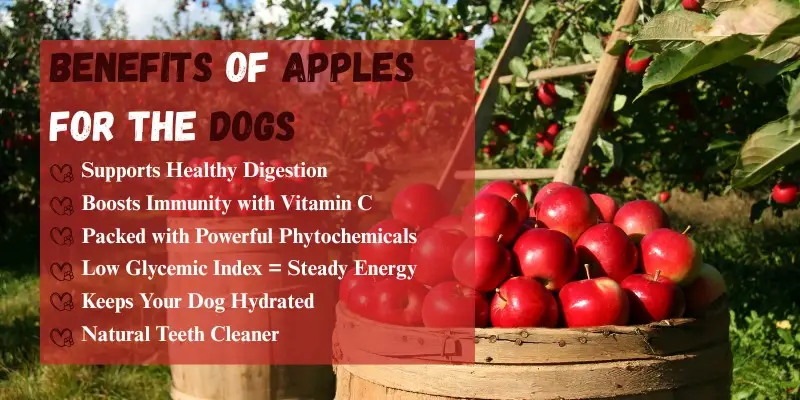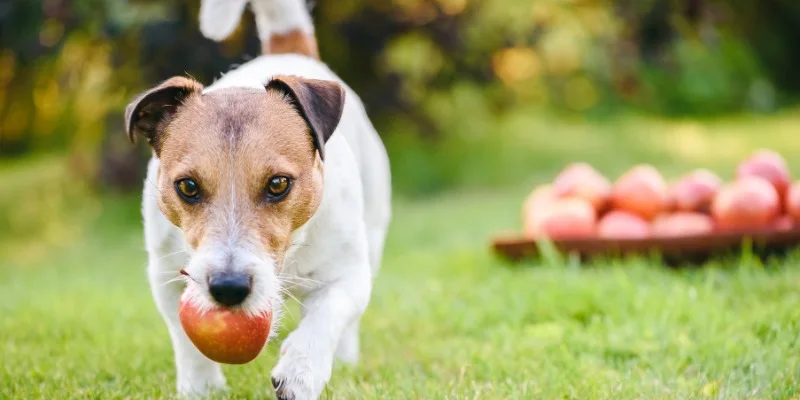Can Dogs Eat Apples? A Vet’s Guide to Feeding Apples Safely 🍏
Published: 9 Apr 2025
Yes, dogs can eat apples. They are packed with fiber, vitamin A, and vitamin C, which support digestion and boost the immune system. Always remove the core and seeds before giving apples to your dog, as the seeds contain cyanide and can be harmful if eaten in large amounts.
Are Apples Safe for Dogs?
Yes—apples are safe for dogs when served in moderation. Apples are a great low-fat, low-calorie treat—especially helpful for overweight, senior, or inactive dogs. Beyond being safe, apples offer some paw-some nutritional benefits:
- Apples contain soluble fiber (like pectin), which supports healthy digestion and may help control blood sugar levels.
- Vitamin C in them acts as an antioxidant, helping reduce inflammation and support the immune system.
- Apples are a great source of Phytochemicals (plant compounds) such as quercetin and catechin, which have anti-inflammatory and anti-cancer properties, support heart health and may improve brain function.
- Low glycemic index – Apples release sugar slowly, making them a better fruit option for dogs than high-sugar fruits like bananas or mangoes.
- Apples are about 85% water, which helps keep your pup hydrated—especially in warmer months or after playtime.
- The malic acid in apples helps whiten teeth. Crunching on apples may also help scrape off soft plaque.

Apple Parts to Avoid
When treating your dog to apples, it’s crucial to be aware that not all fruit parts are safe to consume. Here are the apple parts you should always avoid giving to your dog:
Apple Core:
The hard, central part of the apple that contains the seeds should always be removed. It can be a significant choking hazard, especially for smaller dogs, and can potentially cause an intestinal blockage. Its rigid texture makes it difficult for dogs to digest properly.
Apple Seeds:
Apple seeds contain small amounts of a compound called amygdalin. When chewed or digested, amygdalin can release hydrogen cyanide, which is toxic. A few seeds might not cause harm, but regular exposure can build up and become toxic over time.
Stem
Stems aren’t toxic, but they’re fibrous and hard to digest. They could cause minor stomach upset or get stuck between teeth.
How Many Apples Should a Dog Eat?
I’ve seen well-meaning dog parents overdo it with fruits, thinking “natural” means “unlimited.”While apples are safe and healthy, they shouldn’t be a daily treat in unlimited amounts.
To keep your pup healthy and prevent tummy troubles, treats like apples should never exceed 10% of your dog’s total daily calories. Generally, the guidelines are:
👉 Small dogs (under 20 lbs): 1–2 thin slices per day
👉 Medium dogs (20–50 lbs): 2–4 slices per day
👉 Large dogs (50+ lbs): Up to half an apple per day (sliced)
For a deeper understanding, check out our comprehensive guides on portion sizes, calorie requirements, and feeding schedules to help you feed your dog the right way.
You can also use a Dog Food Calculator to determine your dog’s overall daily caloric needs and then ensure the calories from all treats, including apples, stay within that limit.
Why Moderation Matters:
- Apples contain natural sugar(fructose), which can add up and cause weight gain if overfed.
- Too much fiber can lead to gas, bloating, or loose stools.
How to Feed Apples to Your Dog Safely?
Feeding apples to your dog safely involves proper preparation and portion control. Here’s a step-by-step guide:
- Select a fresh, ripe apple. Avoid bruised or damaged apples.
- Rinse the apple thoroughly under cool running water to remove any pesticides, dirt, or residues
- Use a knife or apple corer to remove the entire core. Carefully inspect the area where the core was to ensure all seeds are removed.
- Depending on your dog’s size, cut the apple into small, manageable pieces or slices. This prevents choking and makes it easier for them to eat. For very small dogs, dice the apple into tiny cubes.
- If your dog has never eaten apples before, offer just a small piece or two initially to see how their digestive system reacts. Monitor for any signs of stomach upset, such as vomiting or diarrhea.
- Always supervise your dog while they are eating apple pieces to ensure they chew them properly and don’t try to swallow large chunks
- Offer a plain apple. Avoid giving your dog apples that are covered in caramel, chocolate, or other human toppings, as these can be harmful or toxic to them.
Fun Ways to Serve Apples to Dogs
Looking for creative ways to treat your dog to apples? Here are some fun and healthy ideas that will keep your pup excited and satisfied!
1. Frozen Apple Slices
If it’s a hot day or your dog loves a chilly treat, freeze some apple slices for a cool, refreshing snack. Simply slice the apple and place the pieces on a tray. Freeze them for a few hours, and voila! A delicious, cooling treat for your pup.
2. Apple, Banana and Strawberry Smoothie
An apple, banana, and strawberry smoothie is a refreshing, healthy treat for your dog. Simply blend 1/2 apple (peeled and cored), 1/2 banana, and 2-3 strawberries with plain yogurt and water or ice cubes. Serve it fresh or freeze it into cubes for a cooling snack.
3. Apple Pup Popsicles
For a DIY doggie popsicle, blend apple slices with water or plain yogurt, pour the mixture into ice cube trays or popsicle molds, and freeze! Your dog will love licking and chewing these fun, hydrating popsicles.
4. Apple Stuffed Kong
Fill a Kong toy with apple pieces, peanut butter, or a mix of both. Freeze the Kong for a longer-lasting treat your dog can work on during the day. This will keep them engaged and help prevent boredom. You can also add other dog-safe treats like carrots or yogurt inside the Kong for added variety.
5. Apple and Oatmeal Dog Biscuits
If you’re into baking, why not whip up some homemade dog biscuits? Simply mix 1 cup of rolled oats, 1/2 grated apple, one egg, and some water or chicken broth. Shape the dough into biscuits and bake at 350°F for 15-20 minutes. Let them cool before serving and store them in an airtight container.
6. Baked Apple Chips
Thinly slice apples and bake them at a low temperature (around 200°F or 95°C) until they are dried and crispy. Avoid adding any spices or sugar. Serve in smaller amounts than fresh apples, as they are more concentrated in sugars.
Can Puppies Eat Apples?
Yes, puppies can eat apples in moderation and with caution due to their developing digestive systems. Start with tiny, pea-sized pieces or finely grated apples to ensure easy chewing and digestion. The natural sugars and fiber in apples can be too much for young pups if given in large amounts, so start slow and monitor your puppy’s stool for any signs of digestive upset. Once your puppy reaches around 3-4 months, they can enjoy apple pieces as training treats. Always supervise and consult your vet if you are unsure about introducing apples or any new food.

When to Avoid Apples for Your Dog?
While apples are generally safe and healthy for most dogs, there are times when you should avoid giving them apples:
1. Dogs with Diabetes or Blood Sugar Issues
Apples contain natural sugar, so if your dog has diabetes or any condition that affects blood sugar, it’s best to limit or avoid apples.
2. Dogs with Digestive Sensitivities
Some dogs have sensitive stomachs or digestive issues like irritable bowel syndrome (IBS). The fiber in apples can sometimes cause gas, bloating, or diarrhea in dogs. If you want to feed apples, consult with your vet first and start with small amounts to see how your dog reacts.
3. Obese Dogs
While apples are low-calorie, they still contain sugar. For dogs that are overweight or obese, it’s important to limit all treats, including apples, to prevent additional weight gain. Always adjust the serving size based on your dog’s specific calorie needs.
Can Dogs Eat Apple-Flavored Products?
It’s generally best to avoid apple-flavored products for dogs, including apple pie, apple-flavored jams and juices, unless you’ve carefully checked the ingredient list and confirmed their safety with your veterinarian. Here’s why:
Artificial Flavors and Chemicals
Many apple-flavored products use artificial flavors and other chemicals to mimic the taste of real apples. These offer no nutritional value and could cause adverse reactions in sensitive dogs.
Added Sugars
These products often contain added sugars to make them more appealing. Excessive sugar intake can lead to weight gain and dental problems in dogs.
Artificial Sweeteners (like Xylitol)
Some sugar-free apple-flavored products may contain xylitol, which is highly toxic to dogs and can be fatal even in small amounts.
Lack of Nutritional Benefits
Unlike fresh apples, these products usually don’t provide the same beneficial vitamins, minerals, and fiber.
I once treated a dog who had been sneaking apple-flavored dog treats every day. While the treats seemed harmless at first, they contained artificial sweeteners and preservatives that led to an upset stomach and digestive issues. Thankfully, after some supportive care to settle his stomach, he made a full recovery. However, it was a stark reminder to his owners – and to all pet parents – that even seemingly harmless treats can be harmful if they contain unhealthy additives. Always check the ingredients and opt for fresh, natural options for your pup!
Conclusion: Can Dogs Eat Apples?
Yes, dogs can absolutely enjoy apples! Not only are they tasty and refreshing, but apples also offer health benefits like improved digestion and hydration. Just remember to slice them up, remove the seeds, and serve in moderation. Skip the apple-flavored treats filled with additives and go for the real deal—your dog will love it! 🍏
Always consult your vet if you’re unsure about introducing new foods to your dog’s diet. Have you tried feeding your dog apples yet? Let us know in the comments, and be sure to share this article with fellow dog parents who’ll appreciate these apple-treat ideas!
Frequently Asked Questions About Dogs and Apples
Let’s discuss some commonly asked questions about dogs and apples.
Yes, dogs can eat green apples! Green apples are just as safe for dogs as red ones. They tend to be slightly tart, so some dogs may prefer the sweeter taste of red apples, but green apples offer the same nutritional benefits.
If your dog accidentally eats a small number of apple seeds, don’t panic—likely, they’ll be fine. However, apple seeds contain cyanide, which is toxic in large quantities. If your dog eats a significant amount of seeds, contact your vet for advice.
Yes, dogs can eat apple peels! The skin is packed with fiber and nutrients. If your dog has a sensitive stomach, you can peel the apple to avoid any potential issues.
It depends on the applesauce. It can be a safe treat for your dog if it’s homemade and free of added sugar, preservatives, or artificial sweeteners like xylitol. Always check the label of store-bought applesauce, as many brands add harmful ingredients that could upset your dog’s stomach or be toxic.
No, apples don’t cause dental issues; they benefit oral health. Apples are about 85% water, so when your dog crunches a fresh slice, that water rinses the teeth and washes away sugar before it sticks. It also dilutes acids that can harm enamel and boosts saliva flow to fight plaque, making apples a tasty, hydrating snack that helps keep your dog’s teeth clean. 🐶🍎

- Be Respectful
- Stay Relevant
- Stay Positive
- True Feedback
- Encourage Discussion
- Avoid Spamming
- No Fake News
- Don't Copy-Paste
- No Personal Attacks

- Be Respectful
- Stay Relevant
- Stay Positive
- True Feedback
- Encourage Discussion
- Avoid Spamming
- No Fake News
- Don't Copy-Paste
- No Personal Attacks





